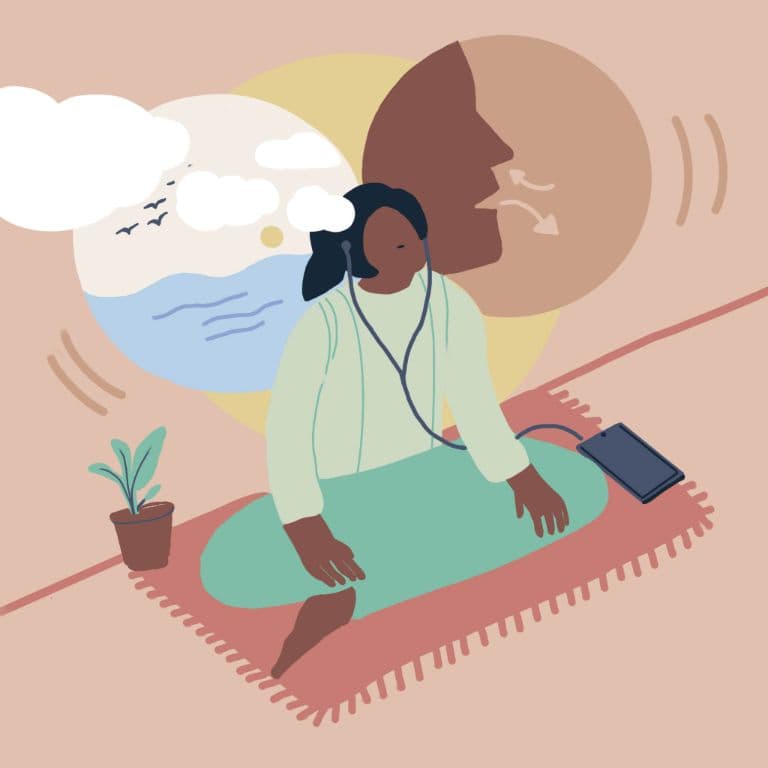A lot of times we all feel like shutting our minds off during stressful situations or stop overthinking something. The more we think about something, the more it attracts similar thoughts, and eventually, it becomes a vicious cycle.
To break this cycle, we need to calm our minds and control our thoughts which are in a continuous process of flowing through our highly receptive heads. Thus, being mindful of our thoughts, and controlling them is more important than ever before, especially in times when negativity and violence are all around us. Various research studies indicate that meditation is helpful for setting well-defined life goals, regular and diverse, be it to overcome a traumatic heartbreak or to increase daily productivity.
Meaning of meditation
The dictionary definition of “meditation” means to reflect upon, think over, or contemplate. It can also denote a devotional exercise of contemplation of a religious or philosophical nature. The word meditate is derived from the Latin word meditari, which means to think about or consider. Med, the root of this word, means to ‘take appropriate measures’. Meditation is, thus, the experience of this union. You may also consider meditation, as the ‘Art of doing nothing’ i.e., letting your mind free, so that thoughts freely come in and freely go out. It is like letting go of all efforts and relaxing in your true nature. Our mind can get distracted at the slightest in present times and achieving this state of mind becomes a task.
During meditation, you focus your attention and eliminate all your jumbled thoughts that may be messing up with your mind and causing mental stress. This may result in enhanced physical and emotional well-being. Let us look at some benefits of meditation.
Benefits of meditation
The benefits of meditation are manifold. It enables a calm mind, focussed attention, good concentration power, clarity of thoughts and feelings, balanced emotions in stressful situations, improved communication skills, development of new skills and talents, inner strength, ability to heal, ability to connect to an inner source of energy, relaxation and rejuvenation. These are all the natural effects of regular meditation practice.
When you meditate, you may clear away the information overload that contributes to your stress. The emotional benefits of meditation can include:
- Gaining a new perspective on stressful situations and discovering possible solutions to them
- Increasing self-awareness
- Building new stress-management and communication skills
- Focusing on the present
- Increasing imagination, creativity, and articulation
- Increasing patience and tolerance
- Letting go of negativity

Meditation might also be useful in improving an underlying medical condition, especially one that may be worsened by stress. It may help people manage symptoms of underlying medical conditions such as:
- Anxiety
- Asthma
- Cancer
- Chronic pain in any part of the body
- Depression
- Heart diseases
- High blood pressure
- Irritable bowel syndrome
- Sleep problems
- Tension headaches
In some cases, meditation can worsen symptoms of certain mental and physical health conditions. Hence, a doctor’s advice may be taken.
Get started with meditation
Remember the feeling of calmness and joy within, while you may be stargazing on a quiet night or sit by a stream, lake, or an ocean only listening to the sound of water, or maybe when you’re sitting quietly to appreciate cool wind and birds chirping while sitting under a tree on an evening. Knowingly or unknowingly you have been in a state of meditation in all these situations. Meditation does not essentially require any planning, or a Himalayan getaway, or a sage’s retreat to start meditation. It's as easy as following your breath inwards and outwards, being aware of each inhalation and exhalation, in a deep and slow motion. It's a state to observe your thoughts and emotions from a distance. The only requirement is your intent to relax and experience the reformation and second a quiet corner in your house.
Simple methods to meditate for beginners
Meditation can be easily incorporated into your daily life. You can choose any form of meditation from many different processes of meditation.
A. Self-meditation
- Sit comfortably with eyes closed in sukhasana or cross-legged pose. You may either keep your back straight or may lie down in Shavasana on a mat with feet slightly apart from each other and body relaxed with head and neck in the center and midline. Your palms may face the ceiling. If you have knee pain and are unable to sit on the floor, sit straight and relaxed on a chair or bed.
- Now bring your attention slowly towards your breathing, that is, focus on your inhales and exhales. Notice the sound of your breaths, observe the flow of air entering and leaving your system, notice its temperature. Observe all the thoughts and emotions that run through you.
- Relax your body parts one by one like arms, fingers, legs, toes, forehead by bringing your attention to them and consciously relaxing them. Practising self-meditation daily for 5 minutes will soothe you and relax your mind.
B. Guided meditation
For a beginner, the easiest way to start meditation is guided meditation. Guided meditations are a set of instructions given by a trained teacher. You may plug in your earphones and follow the instructions. The type of guided meditation that you choose may be based upon your purpose of meditation-
- To relax
- To sleep better
- To think positively
- To stop overthinking
Once your purpose is defined, try and test some of these choices for a few days and see which one your body resonates with and responds to and practice accordingly. Another option is to follow any spiritual guru/ guide who you admire or appreciate. You can practice meditation by getting a membership in their organization of the community, joining their regular classes and workshops.
C. Yog Nidra
Yoga Nidra is a state of conscious sleeping that is physically doing nothing but mentally awake, unlike regular sleeping. It aims at bringing awareness to your mind with the rest of the body relaxed in a sleep-like state. You may practice Yog Nidra by combining it with chanting of ‘aum’ or a mantra. Another way to practice is to count backwards from 27 and align your breathing with your counting. If you get distracted and forget the number you are on, start from the beginning again. This enhances your focus, improves memory, and increases your productivity. Yog Nidra must be practised after a yoga routine and you must try to not fall asleep during the practice of yoga Nidra.
Some important tips while practising meditation
- Avoid meditating soon after a meal as it may adversely affect your digestive abilities. You must wait for at least 2 hours after a meal to practice meditation.
- Sleeping is not meditation. So the best time to meditate is after waking up in the morning or after an afternoon nap.
- A small warm-up session, stretching, walk, or yoga asanas before you sit down to meditate may give better results in improving your overall well-being.
- Wear loose, airy, and comfortable cotton clothes to avoid any discomfort while meditating.
- Try to choose the same time every day.
- Do not believe that meditation is painful, uncomfortable, or only meant for sadhus.
- Do not pay attention to myths like you need to spare at least an hour, you have to sit in a particular posture or there should be no thoughts running through your mind or you need to have good concentration and laser-like focus.
Final Words
Meditation takes patience and practice. Hence, don't judge your meditation skills, and be stressed about them. Just be consistent and keep calm. Your skills will eventually improve. Another thing is to experiment with different forms of meditation, to find out which one/s works best for you and what you enjoy doing. Remember, there's no right way or wrong way to meditate. What matters and eventually works is stress management and improved overall health, physically and mentally.
Disclaimer - This information is educational and should not be construed as medical advice. Please consult your doctor before making any dietary changes or adding supplements.
ProactiveForHer is a digital clinic for women, offering accessible, personalised, and confidential healthcare solutions. We offer out-patient care, diagnostic services and programs for various health concerns of Indian women, across their lifetime - from puberty to pregnancy to menopause.

